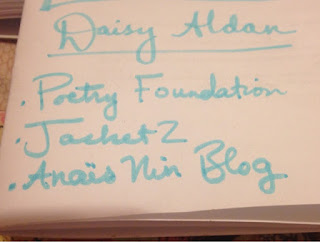 |
| Add caption |
30 Days of Poetry: a Poet's Log Book of Daily Efforts in Poetry for National Poetry Month, Day 1
For "National Poetry Month" people often participate in "NaPoWriMo" - "National Poetry Writing Month", where they write a poem a day. I am forgoing that this time around, though I do love the daily challenges. I once wrote a poem a day for a year. That was amazing and any poet, especially if you're struggling with something or other, should do it. What I am challenging myself to do this month, however, is "NaPoReadMo" -- read a dedicated amount of poetry every day. I'd say on a weekly basis, I read, write or edit a few hours, but with my other endeavors, I definitely let reading poetry go by the wayside.
For Day 1 of my NaPoReadMo, I read a compilation of things I gathered on the poet Daisy Aldan an made a kind of homemade "Selected Works".I feel I have to have poems in front of me on paper in order to really appreciated and get into them. I think it is because unlike reference reading--newspaper, research, non-fiction--we can't "skim" a poem. Indeed one major difference in prose and poetry is that it is purposefully not about skimming the words. Each word is deliberate and integral to the piece.
I mention all this because the purpose of my writing about reading poetry won't just be to talk about the work itself, but to talk about how we read poetry today. So many non-poet friends "don't get it" when it comes to reading poems, which is disheartening. I think so often poetry is taught as if it is a scavenger hunt, "find the metaphor, find the alliteration" instead of experiencing the work as a whole. I want to use these posts as a means of explaining how I read poetry. Part of what helps is having it in paper form and having background music to keep me focused.
These are the three internet source from which I printed to put together a "selected works":
- http://www.poetryfoundation.org/bio/daisy-aldan
- http://anaisninblog.skybluepress.com/2009/08/daisy-aldan%E2%80%99s-poem-for-anais-nin-free-book-offer/
- http://jacket2.org/article/daisy-aldan-new-folder
When I taught poetry to young students, I wouldn't ask for judgment or even interpretation. I simply ask them to observe. What do you notice? Here's what I noticed from my reading:
Aldan has a poem titled "The Little Mermaid" http://www.poetryfoundation.org/poetrymagazine/browse/120/1#!/20595576 written almost two decades before the fairy tale was repopularized by Disney. The feminist issues she addresses in it are still relevant today. The Little Mermaid is a very complicated mythical figure and I recently heard an interpretation of her story in which we no longer say she gives up her voice for a man to love, but for her freedom to be who she wants and love who she wants. This poem made me think of that interpretation.
The other thing I notices is just how brilliant Aldan's chunks of phrasing can be, so striking:
...Ah! There are the Daughters
Of the Air, closer than friends, closer even than breathing.
They see my tears My thoughts become feathers.
In another poem (STONES: Avesbury)
between past and future: fluid, yet in tension
[ ] between sun and moon: fire-conquered chaos in process:
[ ] manifest mind and will: shadow casters confirming
[ ] Him:
[ ] bewitching gods tracking time toward our release in light
(Note: The bracketed space is for posting purposes, in the published poem there's only the space, no brackets) Upon first reading this, I just like the rhythm of it. This, that, elaboration/this, that, elaboration. Re-typing it I see it's something that's striking also because of it's unique use of the colon punctuation mark. That helps enhance the syncopated rhythm. Then of course how the words move across the page and that pushes the reading of it, which enhances the meaning of it. But most especially "fluid, yet in tension" the words fluid and tension are onomatopaeic and when you read them you get them more than you would if they were just laid out, in prose.
I could go on and on but that's not the point of this post a day, either. Today I get to elaborate because it's a Saturday. Other days when I post what I'm reading it might be just a link and a reason why I picked it or something. But the point is reading poetry everyday.
All 30 Days of Poetry entries are here.
